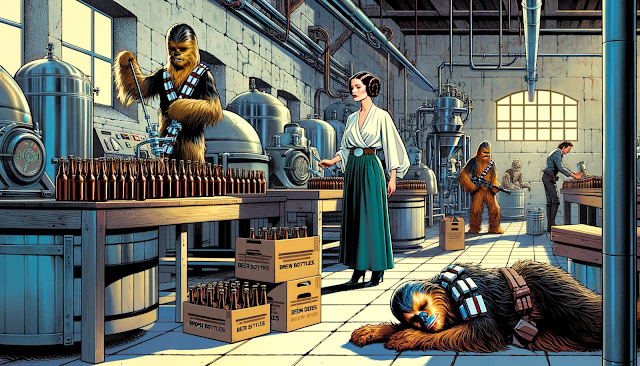Central to this process is the hero – yeast.
Traditionally, brewing yeast has been carefully selected for its specialized attributes, contributing distinct flavors, aromas, and characteristics to the final elixir.
Beer brewers have cultivated yeast so well that it's its own scientific branch!
But what if on brew day you realise you forgot the yeast?
Can you nip into the pantry, pull out some bread-baking yeast and use that instead?
You can indeed brew with baker's yeast but there are some pros and cons, dear brewer...

Pros of Using Baker's Yeast in Brewing:
Baker's yeast, easily procured in dry or fresh forms, stands as a testament to accessibility in the brewing world.It's probably in your kitchen cupboard right now.
The financial aspect of brewing often dictates choices, and baker's yeast emerges as a cost-effective alternative. Compared to specialized brewing yeast, which can be a significant expense, baker's yeast allows for economical brewing without compromising the quality of the end product.
Simplicity defines the fermentation process when using baker's yeast. Its resilience and adaptability make it an ideal choice for novice brewers and those operating with minimal equipment. The uncomplicated nature of handling baker's yeast allows for a more straightforward brewing experience.
The financial aspect of brewing often dictates choices, and baker's yeast emerges as a cost-effective alternative. Compared to specialized brewing yeast, which can be a significant expense, baker's yeast allows for economical brewing without compromising the quality of the end product.
Simplicity defines the fermentation process when using baker's yeast. Its resilience and adaptability make it an ideal choice for novice brewers and those operating with minimal equipment. The uncomplicated nature of handling baker's yeast allows for a more straightforward brewing experience.
Time is of the essence in brewing, and baker's yeast excels in this regard. With a reputation for rapid fermentation, it accelerates the transformation of wort into beer, reducing the overall production time. This characteristic is particularly appealing for those seeking a quicker turnaround from kettle to glass.
Baker's yeast, due to its widespread use in baking, undergoes rigorous quality control. This ensures a consistent and reliable performance in fermentation, providing brewers with a degree of predictability in the brewing process. The reliability of baker's yeast contributes to the reproducibility of beer batches.

Baker's yeast introduces an element of unpredictability to the brewing process due to its inconsistent attenuation levels. Brewers may find it challenging to achieve precise control over the final alcohol content, leading to variations in the perceived sweetness and body of the beer.
Unlike specialized brewing yeast strains that exhibit robust tolerance to higher alcohol concentrations, baker's yeast may struggle in environments with elevated alcohol levels. This limitation can restrict brewers from venturing into the production of high-alcohol content beers. Additionally, baker's yeast can be sensitive to temperature fluctuations, impacting its fermentation performance.
The fermentation process with baker's yeast may result in the production of unwanted byproducts and off-flavors. These byproducts can contribute off-notes and undesirable characteristics to the beer, making it challenging to maintain a consistent and high-quality end product.
Baker's yeast exhibits reduced viability for repitching compared to specialized brewing yeast strains.
Brewers aiming to craft specific beer styles that rely on intricate yeast contributions may face challenges when using baker's yeast. Styles such as Belgian ales or complex sour beers often demand yeast strains with unique characteristics that are not typically found in baker's yeast.
Want our advice?
Baker's yeast, due to its widespread use in baking, undergoes rigorous quality control. This ensures a consistent and reliable performance in fermentation, providing brewers with a degree of predictability in the brewing process. The reliability of baker's yeast contributes to the reproducibility of beer batches.

Cons of Using Baker's Yeast in Brewing:
One of the primary drawbacks of relying on baker's yeast in brewing lies in its limited ability to impart complex and nuanced flavors. Unlike specialized brewing yeast strains, which are carefully cultivated for their intricate aromatic and flavor profiles, baker's yeast tends to produce simpler and less distinctive beer characteristics.Baker's yeast introduces an element of unpredictability to the brewing process due to its inconsistent attenuation levels. Brewers may find it challenging to achieve precise control over the final alcohol content, leading to variations in the perceived sweetness and body of the beer.
Unlike specialized brewing yeast strains that exhibit robust tolerance to higher alcohol concentrations, baker's yeast may struggle in environments with elevated alcohol levels. This limitation can restrict brewers from venturing into the production of high-alcohol content beers. Additionally, baker's yeast can be sensitive to temperature fluctuations, impacting its fermentation performance.
The fermentation process with baker's yeast may result in the production of unwanted byproducts and off-flavors. These byproducts can contribute off-notes and undesirable characteristics to the beer, making it challenging to maintain a consistent and high-quality end product.
Baker's yeast exhibits reduced viability for repitching compared to specialized brewing yeast strains.
Brewers aiming to craft specific beer styles that rely on intricate yeast contributions may face challenges when using baker's yeast. Styles such as Belgian ales or complex sour beers often demand yeast strains with unique characteristics that are not typically found in baker's yeast.
Want our advice?
There's a good reason why brewers use yeast designed to make beer - avoid the bread yeast and choose traditional beer-making yeats.
